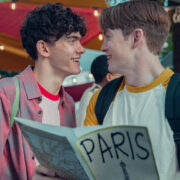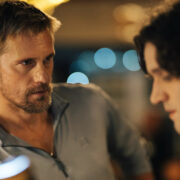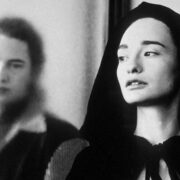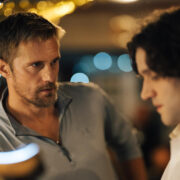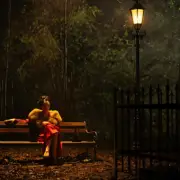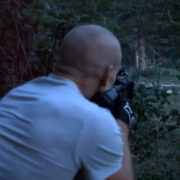NYFF63: Miroirs No. 3, The Mastermind, What Does That Nature Say To You

Lee Jutton has directed short films starring a killer toaster,…
Even though this is my sixth year covering the New York Film Festival, I’m still asking myself the same question I did the first time around: do I want to spend most of my movie-watching time discovering exciting new filmmakers, or checking out new works from some of my longtime favorites? (A privileged conundrum, to be sure, but a conundrum nonetheless.) Despite my time being unfortunately limited, I’ll be trying to highlight a mix of both throughout this year’s festival; however, the below round-up focuses entirely on the latter. Read on for my thoughts on the latest films from three of my favorite contemporary directors (and NYFF regulars): Christian Petzold, Kelly Reichardt, and Hong Sang-soo.
Miroirs No. 3 (dir. Christian Petzold)
Joan Didion famously wrote, “We tell ourselves stories in order to live”—an elegant articulation of how we wrap ourselves up in fictions, even lies, to survive the harsh reality of the world. It’s also a perfect way to describe the motivations of the characters in Miroirs No. 3, the latest film from Christian Petzold. The filmmaker’s fourth collaboration with actress Paula Beer (following Transit, Undine, and Afire) takes its title from a Maurice Ravel piano piece that recurs throughout the film, a musical link between two characters who are carefully tiptoeing around their trauma. Laura (Beer), a pianist from Berlin, has just survived a horrific car crash that killed her boyfriend; even before the crash, she was stuck in a state of ennui that no one around her, boyfriend included, seemed able or willing to understand. Enter Betty (Barbara Auer), a middle-aged woman living alone in the country who witnesses the crash, rescues Laura, and allows her to move in with her to recover.
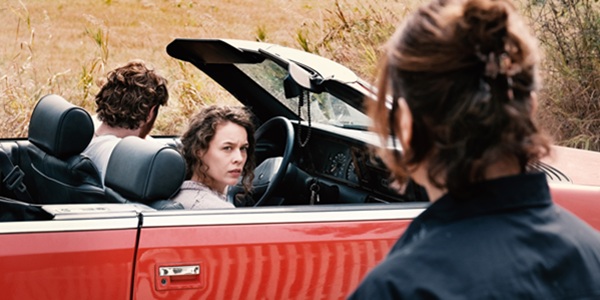
Despite knowing next to nothing about each other’s past (or perhaps because of that), Laura and Betty manage to build a life of mutual respect and care in the aftermath of the accident. When Betty’s estranged husband, Richard (Matthias Brandt), and son, Max (Enno Trebs), reappear, the four of them start to mesh into an actual family unit, with Laura slowly but surely emerging from her protective cocoon of isolation and beginning to re-engage with the world. But there is a shadow hanging over the family in the form of a missing person named Jelena, which darkens aspects of their sunny days together. The mystery at the heart of Miroirs No. 3 is not who Jelena is, or why her absence has left this family in a state of barely submerged anguish—both of those things are rather obvious to the audience—but when Laura will realize what is happening and how she will react, especially in light of her own all too recent loss.
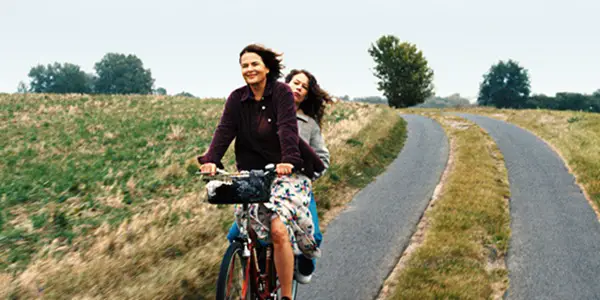
Miroirs No. 3 leaves much unsaid and unexplained throughout its 86-minute running time, but that doesn’t make it any less satisfying. A remarkably understated exploration of complex emotions, the film draws you in and holds you tight courtesy of its quartet of lead actors, all regular Petzold players who deliver powerful, poignant performances; Auer, in particular, does a marvelous job at subtly conveying the almost overwhelming grief lurking behind Betty’s warm smile. In typical Petzold fashion, Miroirs No. 3 relies entirely on diegetic music for its soundtrack, whether that be Laura performing the Ravel piece of the film’s title or Max blasting Frankie Valli and the Four Seasons’ “The Night” while he works in the family garage; in typical Petzold fashion, it works beautifully to set the mood of the film—one that is haunted by the past but still capable of future happiness. It’s a lovely little movie that, even if it feels somewhat minor in the grand scheme of Petzold’s illustrious filmography, is still worth your time.
The Mastermind (dir. Kelly Reichardt)
Kelly Reichardt’s Showing Up (which played at NYFF60) focused on the trials and tribulations of an up-and-coming artist preparing for her first solo show: a moment of great accomplishment that inspires hope for her future career. But what happens if that career never materializes? What do you do when you realize that you’ve never lived up to your potential, and that your dreams of greatness have dissolved into a reality of mediocrity? Such is the conundrum facing the protagonist of Reichardt’s new film, The Mastermind, a delightfully dark comedy-drama about an art school dropout turned amateur art thief struggling to find direction in a country that is just as lost as he is.
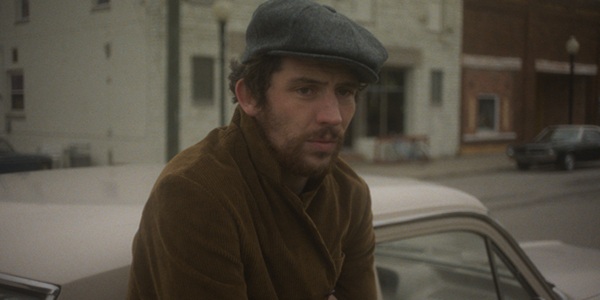
In 1970 New England, James Blaine Mooney (Josh O’Connor, almost as appealingly rumpled as he was in the NYFF61 selection La Chimera) is desperate for something more than his current life as an out-of-work carpenter and suburban dad. (His wife is played by Licorice Pizza standout Alana Haim, who is given disappointingly little to do here.) So, he decides to engineer a heist of four abstract paintings from the local art museum, enlisting a gaggle of variously inept criminals to assist him. Naturally, things go hilariously awry, as they often do when regular people envision themselves capable of pulling off stunts that only make sense in the movies. Mooney is not a mastermind so much as he is a man drowning in his own delusions of grandeur; if he weren’t played by an actor with as much natural charm as O’Connor, it would be all too easy for the audience to lose patience with him. (It’s still pretty easy, to be honest.)
The Mastermind roughly strips away the glamour of the average heist movie to focus instead on the mundanity of what comes afterward, as Mooney finds himself set adrift among so many others who feel as though their lives haven’t gone according to plan. This includes an old art school classmate (played by Reichardt regular John Magaro) living vicariously through the newspaper articles about Mooney’s exploits and willing to take risks for his old friend if it means infusing some excitement into his own unsatisfying life as a small town substitute teacher. Conflicts over the seemingly never-ending Vietnam War simmer in the background until they finally boil over in the film’s bravura final sequence, a sudden eruption of chaos that, once you’ve gotten over the initial shock, feels like the only appropriate ending for such a story.

With a sizzling jazz score by Rob Mazurek, stylish cinematography by frequent Reichardt collaborator Christopher Blauvelt, and great performances by all involved—including Hope Davis and Bill Camp as Mooney’s perpetually disappointed parents—The Mastermind is as well-crafted as you’d expect any Kelly Reichardt film to be. I enjoyed it, yet I also found myself wanting something more from the film’s gloomy second half, even if the more realistic focus on the unfortunate outcome of a heist makes sense in the context of the story Reichardt is telling—the story of a people and a country that would rather dig themselves deeper and deeper into a hole than acknowledge their own failings in the bright light of day.
What Does That Nature Say To You (dir. Hong Sang-soo)
In my view, it’s not the New York Film Festival unless there is at least one film from Hong Sang-soo in the lineup. This year, that film is What Does That Nature Say To You, an awkward and amusing Meet the Parents-type tale with all the typical Hong trappings: a cast full of familiar actors from his unofficial stock company; digital cinematography that is soft and slightly blurred, with lots of long takes and cheeky zooms; and a preoccupation with themes such as the clash between generations and whether it is possible to live an authentic and artistic life, delved into during long-winded conversations over excessive amounts of food and drink. If Hong were any less skilled of a storyteller, it might feel like he was parodying himself at this point, but What Does That Nature Say To You is too enjoyable to be so easily dismissed.
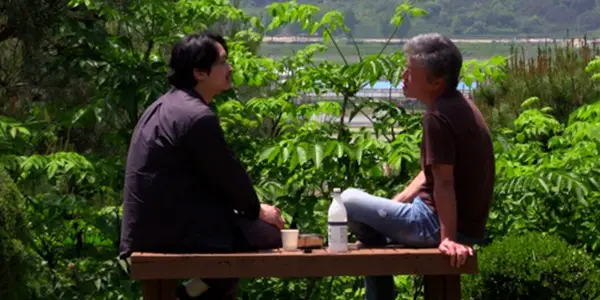
The film begins as struggling poet Dong-hwa (Ha Seong-guk) drops his girlfriend, Jun-hee (Kang So-yi) off at her parents’ sprawling mountainside home. Despite being together for three years, Dong-hwa has never met Jun-hee’s parents; when he impulsively pulls into their driveway to get a closer look at the impressive house, he’s surprised by Jun-hee’s father, O-ryeong (the ever-present Kwon Hae-hyo), and coerced into spending the day with the family, including Jun-hee’s older sister, Neung-hee (Park Mi-so), and her mother, Sun-hee (Cho Yun-hee, who is also Kwon’s real-life wife, giving their scenes together a comfortable, lived-in intimacy).
Throughout the day, Jun-hee’s family quizzes Dong-hwa about his life and his choices, often asking the same questions repeatedly: Why does he drive an old used car? Why did he grow a mustache? And why doesn’t he ask his father, a prominent attorney, for help instead of choosing to live on so little money? Dong-hwa speaks of a desire to live a life of freedom, fully in pursuit of beauty; yet as Neung-hee cannot help but point out over and over (much to Dong-hwa’s mounting frustration), he will always have his father behind him even if he doesn’t actively seek his help. This means that a measure of security is automatically built into his life whether he likes it or not, one that most other so-called starving artists are not privileged enough to have.
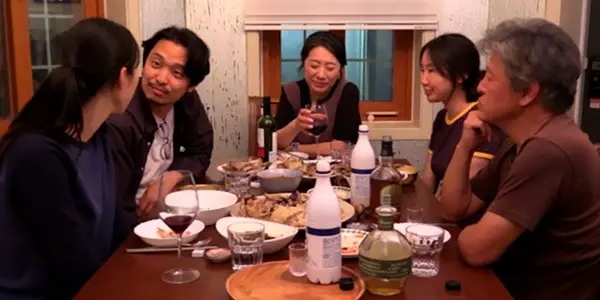
These types of remarks (and a lot of alcohol) gradually chip away at the pretensions Dong-hwa uses as a protective shield until he’s finally exposed for what he really is: someone who says a lot of lofty things but doesn’t have enough real life experience to give them any depth. (It’s impossible not to cackle hearing Dong-hwa say that the reason he doesn’t wear his glasses more often is that he likes the way things look blurry, especially since Hong has essentially shot the whole film slightly out of focus.) Yet Ha, who has played similarly annoying artist characters across most of Hong’s recent filmography (he’s become the stand-in for what younger Hong once was, whereas Kwon is the stand-in for what older Hong now is), ensures that there are enough layers to Dong-hwa’s character that we (and the family) at least start out having a decent amount of sympathy for him; it’s only as the layers are peeled back that we (and the family) realize how insufferable he actually is. You’ll laugh, you’ll cringe, you’ll want a glass of makgeolli; most importantly, watching What Does That Nature Say To You, you’ll know Hong Sang-soo has still got it.
Miroirs No. 3, The Mastermind, and What Does That Nature Say To You are all screening as part of the Main Slate of the 63rd New York Film Festival, which runs from September 26 to October 13, 2025.
Does content like this matter to you?
Become a Member and support film journalism. Unlock access to all of Film Inquiry`s great articles. Join a community of like-minded readers who are passionate about cinema - get access to our private members Network, give back to independent filmmakers, and more.
Lee Jutton has directed short films starring a killer toaster, a killer Christmas tree, and a not-killer leopard. Her writing has appeared in publications such as Film School Rejects, Bitch: A Feminist Response to Pop Culture, Bitch Flicks, TV Fanatic, and Just Press Play. In addition to movies, she's also a big fan of soccer, BTS, and her two cats.


